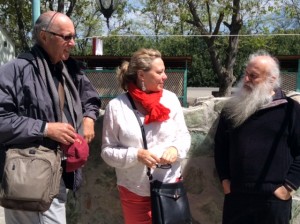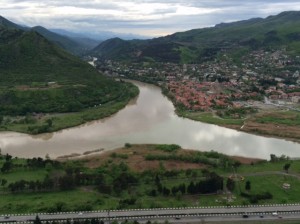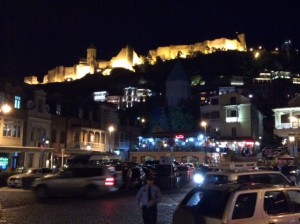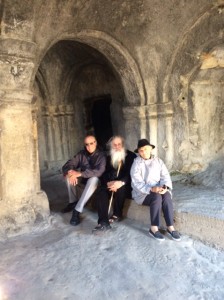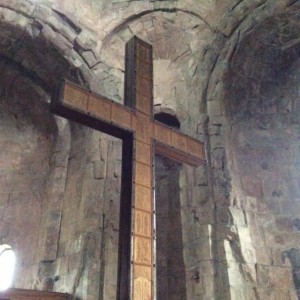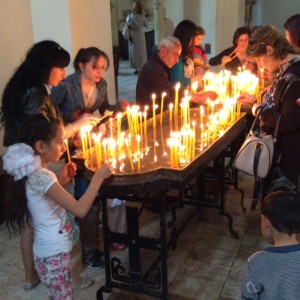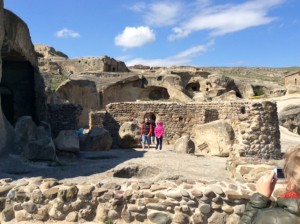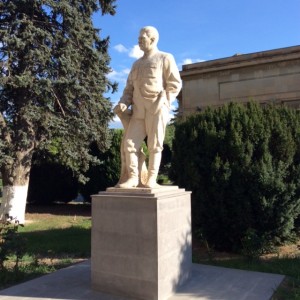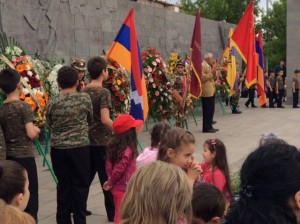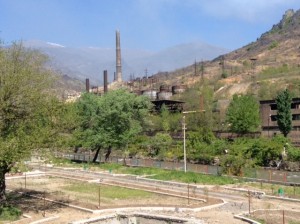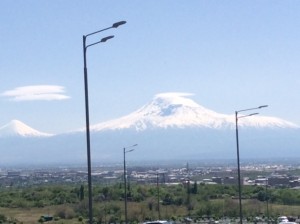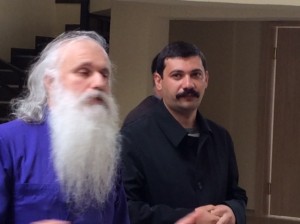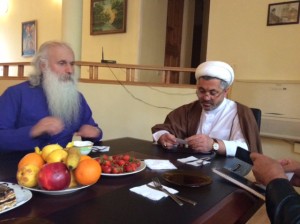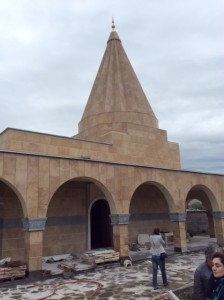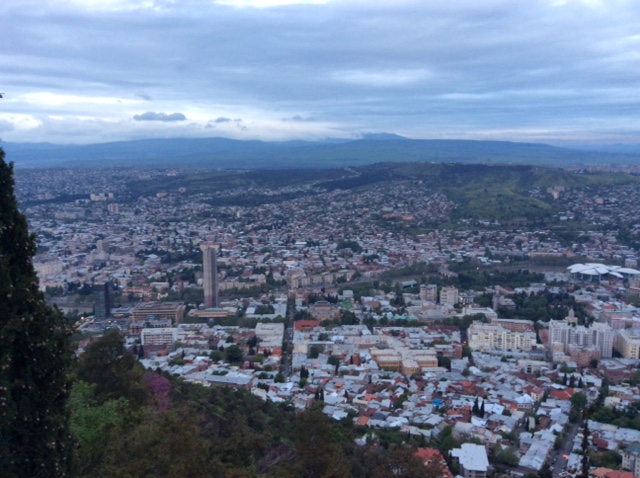Georgia on My Mind
I made a visit to Georgia and Armenia May 2015 as part of an exploration of Tbilisi as a site for a specialized campus to transition highly competent students from Syria and Iraq to Western Universities – students who have had their studies disrupted because of war and violence. This blog focuses on the unique and perilous geo-political situation of Georgia and Armenia, their survival strategies and comments on their interesting history, geography and personalities.
Most people do not spend a lot of time thinking about the Republic of Georgia or for that matter its neighbor Armenia. They make the news when Russia takes another bite out of Georgia, if the dispute about whether or not a genocide occurred a century ago becomes a bit heated or possibly a really good earthquake. What is truly amazing is that they exist at all.
I was living on the Indian sub-continent in 1972 and heard Indira Gandhi deliver the speech celebrating 25 years of Independence. I recall her opening line – “The greatest achievement of India is that we have survived…”. That was indeed an achievement but put that into context with Georgia and Armenia who against all odds have remained as independent and identifiable nations for millennia!
Leona and I visited Georgia and Armenia with the objective of investigating if this remote but volatile corner of the world could host a program to rescue promising students from the turmoil of the Middle East. Tbilisi is at the very fringe of our Western Civilization and at the same time adjacent to another and at the epicenter of a volatile region.
- Art with VP Marketing of LCC international University which we founded in the Soviet Union in 1991. The other person is the Baptist Bishop of Georgia.
- Georgia – Rugged beauty and cities as old as Rome.
Look at a map. Georgia and Armenia are surrounded by three empires or growling residues of empire. Turkey in the form of the Ottoman Empire dominated the region for centuries and is responsible for the pain of Armenia and the shrinking of Georgia. Russia was invited to expel the Turks which they did. Becoming part of the Soviet Empire was the reward. Georgia even contributed favorite son Joseph Stalin as a form of thank you. Iranian influence goes back millennia.
- Castles and Churches dominates the high places.
- Art and Leona with our Friend the Bishop.
How did these two nations with a combined population less than Israel with distinct languages, religions and cultures survive for millenia? Geography is part of the answer. The Caucasian mountains to the north serve as a barrier from the volatile tribes of the North Caucasus (think Chechnya) and create some distance from the Russian heartland. The access to the south is similarly characterized by difficult geography. Geography undoubtedly played a part but a combination of religion and a fierce ethnicity were likely decisive.
- Religion matters in Georgia and defines its difference from the neighborhood.
- The Armenian Orthodox Church is still the center of Armenian self-identity.
Most of us consider this part of the world as remote and marginal to our thinking and experience. I have a strange personal history. My Mother was born on the north slope of the Caucasian mountains among the nomadic tribes known as Cherkessians and part of the historic challenge to Russian dominance. She was a member of a remote but successful Mennonite settlement given a land grant by the czars – presumably with the objective of helping to occupy and pacify this recently conquered and rebellious region. Mother became an American citizen in the thirties and when crossing the border if she stated her birthplace as Russia – many questions. Mother opted to state Georgia as her birthplace and was graciously welcomed.
- Cave City occupied until 1500.
- Stalin lives on and is honored in his birthplace.
Most of the world has come to accept or believe that borders should not be violated or changed but this region has yet to receive that message. To the north Moldova is challenged by a spirited Trans-dniestra. Ukraine is more visibly troubled with the events in Crimea and Eastern Ukraine. After the collapse of the Soviet Union, Abkhazia, the most western part of Georgia managed to disengage with more than incidental help from Russia. In 2008 a similar process led to a short war between Russia and Georgia with South Ossetia going the way of Abkhazia. In the meantime Armenia remembered that the neighboring region of Nagorno-Karabakh had been transferred to Azerbaijan by Lenin on a day when he was repaying some favor. People in this region never forget anything and when the opportunity arose Armenia attacked and took the region back. In this instance Russia was inclined to back Armenia.
To the south Iraq is being effectively dismembered as Kurdistan becomes an increasing reality and the future borders of Syria and a lesser Iraq are called into question. The unsatisfactory situation of Bosnia and Srpska come to mind and the shape of a future Israel and Palestine remains unresolved. Moving just a little south and west we can consider the Horn of Africa. Somaliland has become another country, Eritrea recently split from Ethiopia, Libya is effectively fractured and Sudan has divided into two. What is going on?
We look at each of these as unique and singular events but when virtually every border of a very large region is in play something bigger is going on.
Back to Georgia and Armenia. How do these remarkable countries survive at all in the middle of chaos? It is notable that they are making different strategic bets on their futures. Georgia sees itself as an extension, politically and culturally of the new Europe. It envisions itself as a western democracy, part of Schengen and a future as a full member of the EU. More controversially it promotes a future as part of NATO which would secure its northern flank and make Turkey a partner to the south. Russia has signaled very clearly that NATO is not in the cards and Georgia risks further direct or indirect pressure from Russia.
Armenia made the unexpected decision to ally with the new economic constellation based around Russia. Armenia has essentially nothing of value to sell to Russia (or it seems to anyone) beyond its cognac. Its value to Russia is a bit baffling with the singular exception of providing a forward military position to Russia in circumstances where NATO is viewed as an increasing threat. Access to Armenia makes the volatile Middle East more accessible. An alliance with Russia is also insurance against a sullen and wealthy Azerbaijan.
The internal political and economic history of Armenia is no less volatile. Consider the physical logistic reality of a land-locked Armenia. Turkey to the south is probably not a current military threat but the continuing argument about the events of 1915 are not helpful. Notably Turkey elected to commemorate the start of the WWI Gallipoli campaign, which it won, on the exact date commemorated as the beginning of the Armenian ‘genocide’ and thereby forcing world leaders to choose which event to attend! (Nothing actually happened in Gallipoli on that 1915 date). Iran lies to the Southeast and little needs to be added. Azerbaijan shares the long northern border and the recent war in the Nagorno-Karabakh region which Armenia won results in a sealed border. Georgia to the North has a friendly border and represents the only land access to Armenia’s current patron Russia. Regrettably the Russian attack on South Ossetia results in a frozen border for Georgians. Technically Armenian people and goods can transit this rather problematic path. The only real access to the world for Armenia is via Moscow by air or 7 hours of bad road from Tbilisi. We took the bad road using a van with steering on the wrong side – a challenge on narrow mountain roads.
The old Soviet Union with its centralized economy could force outcomes. There is a historic rail connection through wild valleys between Tbilisi and Yerevan. Authorities located a great deal of heavy industry along this corridor. Given the events of 1991, changes in the Soviet economy plus the isolation described above, this entire corridor now represents a moonscape of abandoned and grotesque remnants of an industrial empire that died but nobody came to bury the remains. Yerevan is a surprising exception. It is a modern city in the shadow of Mount Ararat with a pleasant semi- tropical climate, palm trees and most of the trappings of modernity. Armenia has a large and prosperous diaspora but politically and economically is on a path to nowhere.
- Armenia industrial landscape. Ready for a movie set of the apocalypse.
- The biblical Mt Ararat looms over Yerevan.
Georgia felt more hopeful in spite of the fact that they claim to have experienced three civil wars plus two invasions from Russia – all since 1991. After the disastrous experience with President Shevardnadze, a gift from the Soviet Empire, Georgia had an interesting experience with a sophisticated and dynamic reformer Saakashvili. He built infrastructure, attracted foreign investment and oriented Georgia to Europe and the West. Eliminating corruption was a singular achievement accomplished by firing and replacing the entire police force on one day, then building all glass police stations to symbolize transparency – it worked. It seems he forgot about the social needs of the common man and was unceremoniously unelected. The new regime has reverted to former habits of jailing those who preceded them. Saakashvili and much of his cabinet have re-invented themselves as advisors to the new reformist Ukrainian regime. Meanwhile the new political masters are proving to be totally incompetent and will likely have a limited mandate. In spite of these challenges Georgia felt dynamic, relevant and generally hopeful. It is an incredible country of natural beauty, historic treasures and vibrant people.
Tbilisi like Yerevan is a modern city that dominates its country and society. Our work involved visits with leaders of the Government, the economy, the Academy and the Church. This included the various Christian religious flavors, an Imam who represents both Sunni and Shia and we met Yezidis relocated from Iraq. When the Baptist bishop dresses like an orthodox priest, is surrounded by icons and celebrates communion in front of a Menorah, the Imam describes himself as a ‘good Christian’ and the Yezidi spiritual leader looks like he is ready for a meeting with the bank you know you are in an unusual place.
Georgia represents one of the few places in the world where you can be away from the crowd and experience culture, fantastic natural beauty and a dynamic and energetic population. The challenges are genuine but it represents a place where it is possible to be hopeful. We plan to return and invest.
Put Georgia on your bucket list but come soon before it becomes simply another normal country – or events take it in an unpleasant direction.

